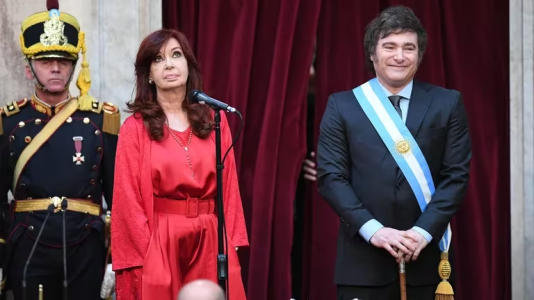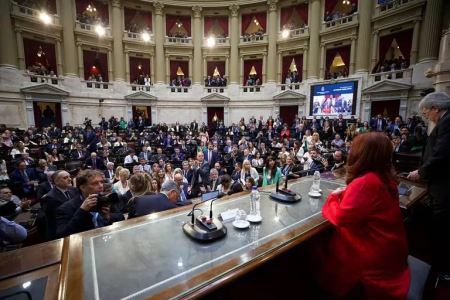Trisha
New member
What is the labor reform proposed by Cristina Kirchner like? - Infobae

Source:

 www.infobae.com
www.infobae.com
February 14, 2024
The former vice president proposed in a document published on social networks that “provide answers to new forms of labor relations”

Vice President Cristina Kirchner, at the gala for the transfer of command to Javier Milei
Former president Cristina Kirchner published this morning on her social networks a 33-page document with harsh criticism of the government of Javier Milei and a negative balance on the management of the Frente de Todos , but she also left some proposals for Peronism to debate in the coming years. years, including moving forward with labor reforms . The phrase she used was “a job update is unavoidable.”
“It is unavoidable to seriously discuss a labor updating plan that provides responses to the new forms of labor relations that have emerged in light of technological advances and a pandemic that disrupted each and every area of people's lives,” he indicated. in conclusion number 10 of your document.
According to her view, the former vice president considered that there are issues that have not been analyzed in detail or that need new regulations, such as “ teleworking ” and “ digital platforms, which mediate between supply and demand, are some of the modalities that must be implemented.” protect normatively.” But she also gave indications that existing labor legislation needs to be reformed.
"However, the forms of labor contracts already included in our legal system must also be reviewed , by updating collective labor agreements - many of which date back decades - taking into account the new realities mentioned above," he stressed. in the same section, echoing some of the usual criticisms from business sectors.
Anticipating the union reproaches that it could receive, CFK stressed that “these updates must respect the rights won by workers , but they must also be carried out under the concept that once enshrined, rights entail obligations that must be fulfilled.” With rhetoric similar to that of Javier Milei, the two-time head of state warned about some prerogatives of sectors of employees: “Otherwise, the exercise of a right without compliance with its correlative obligations is nothing more nor less than a privilege ".

The proposal to move towards labor reforms joins other areas of discussion about the future of the country. The description, in political terms, resembles an electoral platform of proposals that - according to the former vice president - is not exhaustive, but enumerative, and which includes definitions on the role of the State, economy, security, and education . The economic agenda promoted by the former president includes “discussing a regime of incentives for large investments that add value and transfer technology,” or “the integration of state companies both through the participation of private capital and the provinces.” ”.
In an attempt to summarize the balance of her presidential mandates, Cristina Kirchner stated that “the growth of the economy in Argentina and its possibility of development with well-paid work has only been achieved with a pattern of accumulation supported by an industrialist model with an export bias with added value, with low volumes of external debt or with a correct and responsible administration of the same”, and not like the one now proposed by La Libertad Avanza (LLA), which it defined as a kind of fourth neoliberal experience.
For Fernández de Kirchner, “all the measures adopted so far are repetitions of policies already implemented in the past, including some of them applied with Parliament closed by the dictatorship.” At this point, he points out that “they all failed miserably, causing only poverty and pain.”
In this framework, he insisted that reissuing a similar political proposal that he tried to carry out in his presidential mandates, which "does not mean denying the need for a review of this model in regards to the corrections demanded by the productive structure of Argentina." , which allows us to deepen the export bias, propose an unavoidable job update or contemplate the creation or transformation of companies in the form of a virtuous public and private association, as was done with YPF before its denationalization.

Source:

Cómo es la reforma laboral que plantea Cristina Kirchner
La ex vicepresidenta propuso en un documento publicado en las redes sociales que “brinde respuestas a las nuevas formas de relaciones laborales”
February 14, 2024
The former vice president proposed in a document published on social networks that “provide answers to new forms of labor relations”

Vice President Cristina Kirchner, at the gala for the transfer of command to Javier Milei
Former president Cristina Kirchner published this morning on her social networks a 33-page document with harsh criticism of the government of Javier Milei and a negative balance on the management of the Frente de Todos , but she also left some proposals for Peronism to debate in the coming years. years, including moving forward with labor reforms . The phrase she used was “a job update is unavoidable.”
“It is unavoidable to seriously discuss a labor updating plan that provides responses to the new forms of labor relations that have emerged in light of technological advances and a pandemic that disrupted each and every area of people's lives,” he indicated. in conclusion number 10 of your document.
According to her view, the former vice president considered that there are issues that have not been analyzed in detail or that need new regulations, such as “ teleworking ” and “ digital platforms, which mediate between supply and demand, are some of the modalities that must be implemented.” protect normatively.” But she also gave indications that existing labor legislation needs to be reformed.
"However, the forms of labor contracts already included in our legal system must also be reviewed , by updating collective labor agreements - many of which date back decades - taking into account the new realities mentioned above," he stressed. in the same section, echoing some of the usual criticisms from business sectors.
Anticipating the union reproaches that it could receive, CFK stressed that “these updates must respect the rights won by workers , but they must also be carried out under the concept that once enshrined, rights entail obligations that must be fulfilled.” With rhetoric similar to that of Javier Milei, the two-time head of state warned about some prerogatives of sectors of employees: “Otherwise, the exercise of a right without compliance with its correlative obligations is nothing more nor less than a privilege ".

The proposal to move towards labor reforms joins other areas of discussion about the future of the country. The description, in political terms, resembles an electoral platform of proposals that - according to the former vice president - is not exhaustive, but enumerative, and which includes definitions on the role of the State, economy, security, and education . The economic agenda promoted by the former president includes “discussing a regime of incentives for large investments that add value and transfer technology,” or “the integration of state companies both through the participation of private capital and the provinces.” ”.
In an attempt to summarize the balance of her presidential mandates, Cristina Kirchner stated that “the growth of the economy in Argentina and its possibility of development with well-paid work has only been achieved with a pattern of accumulation supported by an industrialist model with an export bias with added value, with low volumes of external debt or with a correct and responsible administration of the same”, and not like the one now proposed by La Libertad Avanza (LLA), which it defined as a kind of fourth neoliberal experience.
For Fernández de Kirchner, “all the measures adopted so far are repetitions of policies already implemented in the past, including some of them applied with Parliament closed by the dictatorship.” At this point, he points out that “they all failed miserably, causing only poverty and pain.”
In this framework, he insisted that reissuing a similar political proposal that he tried to carry out in his presidential mandates, which "does not mean denying the need for a review of this model in regards to the corrections demanded by the productive structure of Argentina." , which allows us to deepen the export bias, propose an unavoidable job update or contemplate the creation or transformation of companies in the form of a virtuous public and private association, as was done with YPF before its denationalization.

